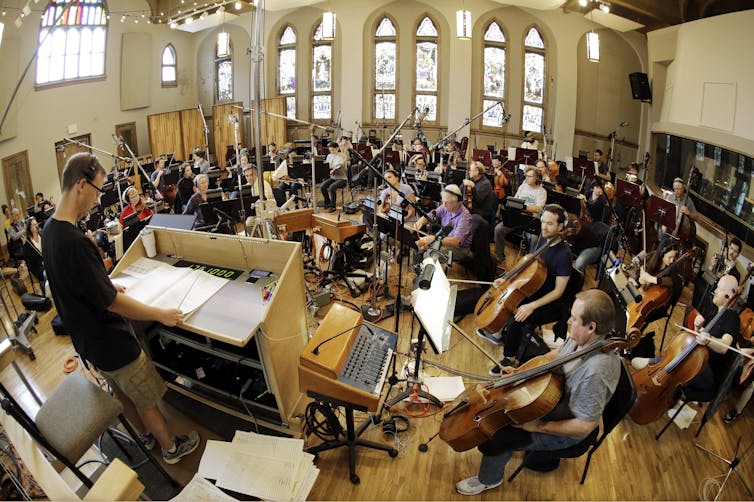Key Takeaways:
Starfield, a highly anticipated video game, allows players to build their own character and spacecraft, travel to multiple planets, and follow multiple story arcs. The game’s interactive music uses a palette of musical language that cultivates a contemplative soundscape, launching the listener into the vastness of space while remaining curious, innocent, and restrained. The London Symphony Orchestra performed the “Starfield Suite” before a sold-out audience at the Alexandra Palace Theatre. Video games have become an exclusive form of music, with more young people listening to orchestral music through their game consoles than ever before. The fusion of advanced technology and scholarship has forged worlds like those found in the “Assassin’s Creed” franchise, which can act as time machines that allow players to explore ancient Greece with historically informed soundtracks accompanying them on their journeys. As the gaming industry continues to expand, symphonic music is being recognized for its emotional and atmospheric underpinnings.
“Starfield” is one of the most anticipated video games in recent history.
The game, which was released on Sept. 6, 2023, allows players to build their own character and spacecraft, travel to any one of a thousand or more planets and follow multiple story arcs.
The soundtrack is equally epic, with audio director Mark Lampert describing the game’s music as a “companion to the player,” with a “sense of scale” that “had to be totally readjusted,” in a recent interview about Starfield’s sound design.
Soundtracks for outer space have appeared in many films – “Star Wars,” “2001: A Space Odyssey” and “Interstellar,” to name a few.
But the interactive music of “Starfield” does something different: Utilizing a palette of musical language that cultivates a contemplative soundscape, it launches the listener into the vastness of space while remaining curious, innocent and restrained. If you close your eyes, you can imagine it being performed in the concert hall.
That’s exactly what happened prior to the game’s release, when the London Symphony Orchestra performed the “Starfield Suite” before a sold-out audience at the Alexandra Palace Theatre, one of the world’s most prestigious concert halls.
As a conductor, musician and educator, I’m excited about games like “Starfield” because they’re drawing people to symphonic music like never before.
Classical music becomes exclusive
Before recording technology, the only way to hear music was to experience it live. Throughout early history, music functioned as an integral part of cultural life: It was played at festivals, accompanied religious services and even served as a means of communication.
During the time of the Renaissance, around the middle 15th to 16th centuries, there was a shift from music as function to music as art and entertainment.
Soon, live vocal and instrumental music became a form of popular entertainment, and people clamored for bigger and better sounds. In the 16th century, the marriage of art, drama and music was consummated in opera. During the 17th and 18th centuries, instruments continued to evolve, large concert halls and opera houses were built, and composers explored new ideas that pushed boundaries.
What’s now known as “symphonic music” was born: music that was performed by a symphony orchestra. A symphony is not only a large group of musicians, but it is also a piece of music written by a composer containing multiple movements.
To hear a performance of Beethoven’s Fifth Symphony, you had to witness a symphony orchestra play it, and crowds clamored to gain entry to concert halls hear the newest and most acclaimed composers’ works.
During the 18th and early 19th centuries, however, a set of social rules calcified around this music: how to listen, what to wear, where to sit and when to applaud. As tastes and technologies began to change in the late 19th century, the masses were drawn to new forms of music like jazz. Concert halls, meanwhile, became the realm of high culture, high art and high society.
A clear divide between popular music and what became known as “classical” music emerged. That divide still exists today.
Many argue that the classical music world is no longer accessibleto most people – it’s seen as too intimidating and too stuffy, with works that are too long and tickets that are too expensive. Meanwhile, symphony orchestras around the world are scrambling to diversify their music and ranks within a tradition and culture that was long reserved for the highly educated, wealthy and white.
From ‘bleeps and bloops’ to symphonic music
Due to limitations in hardware, early video games utilized synthesized “bleeps and bloops.” However, these constraints spurred programmers to think about creative ways to make games more immersive through sound.
Today, video games do not have the same limitations. Composers have the agency to create soundscapes that utilize the most advanced hardware and software, and they can employ some of the best musicians in the world to record award-winning soundtracks.
In a 2021 interview, video game composer and conductor Eimear Noone said, “More young people listen to orchestral music through their game consoles today than have ever listened to orchestral music in the history of music.”
She’s probably right. There are over 3 billion gamers around the world, and people between the ages of 18 and 25 spend the most time playing video games. A 2018 poll conducted by the U.K.‘s Royal Philharmonic Orchestra found that more young people are exposed to classical music through video games than through attending live performances.
The fusion of advanced technology and scholarship has forged worlds like those found in the “Assassin’s Creed” franchise, which can act as time machines that allow players to explore ancient Greece, with historically informed soundtracks accompanying them on their journeys.
In Activision’s “Sekiro: Shadows Die Twice,” composer Yuka Kitamura used traditional Japanese instruments to craft a sound informed by Japan’s Sengoku period; the music of “Civilization IV” contains tracks influenced by composers throughout history; and many of today’s most popular video game titles feature classical music.
“Thanks to video games,” Boston Globe music writer A.Z. Madonna wrote, “I fell in love with classical music.”

Getting the recognition it deserves
Today’s video game music is more interactive and nonlinear than traditional concert hall and film music. This means that composers think differently when writing for games. Tools, technologies and education for composers and musicians are changing.
The increasing complexity of video games means composers are once again pushing boundaries through expanded sound palettes. Like “Starfield,” many modern game titles incorporate symphonic music needed to provide the emotional and atmospheric underpinning of the game experience.
As the gaming industry continues to expand – it’s projected to earn US$533 billion globally by 2027 – video game soundtracks have become more and more popular. When a game is released, music streaming platforms routinely release an accompanying soundtrack.
The classical music world and symphony orchestras may finally be catching on.
In 2022, the BBC Proms, a daily summer concert series that features classical music in London, included video game music performed by the Royal Philharmonic Orchestra for the first time in history. In 2023, the Grammys recognized “Best Video Game Soundtrack” as an official category for the first time. Its inaugural winner was Stephanie Economou for her work on “Assassin’s Creed Valhalla: Dawn of Ragnarök.”
Today, there are a number of symphonic concert series – GameOn!, Game Concerts, Distant Worlds and VGL – that feature live video game music performed by top orchestras.
“Starfield” will be marked by beautiful graphics, interactive game play and a compelling story, but holding it together will be the gravity of its sonic landscape. Video game music has come a long way from its first “bleeps and bloops.” Symphonic music will continue to accompany players’ video game journeys, and like “Starfield,” the sky is no longer the limit.





























